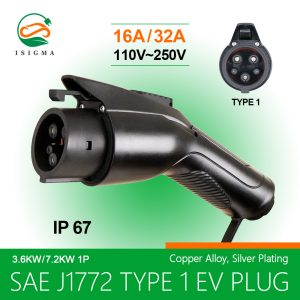
Introduction
The increasing popularity of electric vehicles (EVs) has led to a growing need for convenient charging solutions. One such solution that has gained traction in recent years is portable EV chargers. These compact and versatile devices allow EV owners to charge their vehicles on the go, providing a new level of flexibility and convenience. In this article, we will explore the benefits and features of portable EV chargers and how they are empowering electric vehicle owners.
- Understanding the Need for Portable EV Chargers
As the number of electric vehicles on the road continues to increase, the demand for accessible charging options has become crucial. While many EV owners have access to charging stations at home or public locations, there are instances where these options may not be readily available. Portable EV chargers offer a convenient solution for situations when you need to charge your EV while away from traditional charging infrastructure. - Advantages of Portable EV Chargers
Portable EV chargers provide several benefits that make them a valuable accessory for EV owners. Let's explore some of these advantages:
Flexibility and Convenience:
With a portable EV charger, you can charge your vehicle wherever a power source is available. This flexibility allows you to travel long distances without worrying about finding a charging station.
Emergency Charging: Portable EV chargers serve as a backup solution in case of emergencies or when unexpected charging needs arise. Whether you're on a road trip or faced with a depleted battery, a portable charger can save the day.
Cost Savings: By utilizing a portable charger, EV owners can avoid potential fees associated with public charging stations. Additionally, charging at home or using a portable charger often costs less than relying on fast charging services.
Easy Installation: Portable EV chargers are designed for easy setup and installation. Most models come with user-friendly interfaces and require minimal technical knowledge to operate.
- Types of Portable EV Chargers
Portable EV chargers come in different types to accommodate various charging needs. Here are the three common types:
Level 1 Chargers
Level 1 chargers provide a basic charging solution, typically utilizing a standard household 120-volt outlet. While they are the slowest charging option, they are convenient for overnight charging or when time is not a limiting factor.

Level 2 Chargers
Level 2 chargers offer faster charging speeds compared to Level 1 chargers. They require a 240-volt outlet and are commonly found in residential settings, public parking lots, and workplaces. Level 2 chargers are ideal for EV owners who need a quicker charge while on the go.

- Factors to Consider When Choosing a Portable EV Charger
When selecting a portable EV charger, it's essential to consider the following factors:
Charging Speed
The charging speed of a portable charger determines how quickly your EV's battery will recharge. Consider your daily driving habits and charging needs to choose a charger with an appropriate charging speed.
Portability and Durability
Since the primary purpose of a portable EV charger is mobility, it's crucial to select a device that is lightweight, compact, and easy to carry. Additionally, durability is important to ensure the charger can withstand various environmental conditions.
Safety Features
Look for chargers with built-in safety features such as overcurrent protection, overvoltage protection, and short-circuit protection. These features help safeguard both your EV and the charger from potential damage.
Compatibility
Make sure that the portable EV charger you select is suitable for your particular electric vehicle. Different chargers support different charging standards, so it's important to verify compatibility before making a purchase.
Price
Consider your budget when selecting a portable EV charger. While cost is a factor, it's important to balance it with the charger's features, quality, and reliability.
- How to Use a Portable EV Charger
Using a portable EV charger is a straightforward process. Below are the basic steps to follow:
Step 1: Plug the Charger into a Power Source
Locate a suitable power source, such as a standard electrical outlet or a dedicated EV charging station. Connect the charger to the power source。
Step 2: Connect the Charger to Your Electric Vehicle
Depending on the charger and EV model, you may need to use an adapter or a specific charging cable. Connect one end of the charger to your EV and ensure a secure connection.
Step 3: Start the Charging Process
Once the charger is connected, start the charging process as per the manufacturer's instructions. Some chargers have additional features, such as timers or charging level adjustments, which can be customized to meet your requirements.
- Best Practices for Charging with Portable EV Chargers
To maximize the effectiveness and safety of charging with a portable EV charger, consider the following best practices:
Regular Maintenance and Inspections: Periodically inspect your portable charger for any signs of damage or wear. Follow the manufacturer's recommended maintenance guidelines.
Ensuring Proper Electrical Connections: Always ensure a secure and reliable electrical connection when using a portable charger. Faulty connections can lead to inefficient charging or safety hazards.
Following Manufacturer Guidelines: Read and understand the user manual provided by the charger manufacturer. Adhering to the recommended guidelines will help optimize the charging process and ensure the longevity of both the charger and your EV.
- The Future of Portable EV Chargers
As the adoption of electric vehicles continues to grow, so does the innovation in portable EV chargers. Future advancements may include even faster charging speeds, increased portability, and enhanced compatibility with different EV models. Additionally, advancements in battery technology may lead to smaller and more efficient portable chargers.

Conclusion
Portable EV chargers have revolutionized the way electric vehicle owners approach charging. With their flexibility, convenience, and cost-saving benefits, these compact devices empower EV owners to travel with confidence and charge their vehicles wherever they go. As the demand for electric vehicles rises, portable EV chargers will play a significant role in supporting the charging infrastructure and making EV ownership more accessible and convenient.






 Code:XWHX8SQJ
Code:XWHX8SQJ